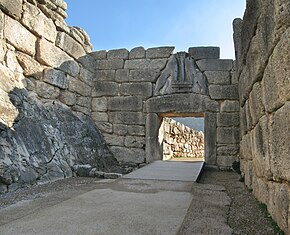Mycene
| Μυκῆναι Μυκήνη |
|

The Lion Gate at Mycenae, the only known monumental sculpture of Bronze Age Greece
|
|
| Location | Argolis, Greece |
|---|---|
| Coordinates | Coordinates: 37°43′51″N 22°45′23″E / 37.730792°N 22.756382°E |
| Type | Settlement |
| History | |
| Periods | Bronze Age |
| Cultures | Ancient Greece |
| Official name | Archaeological Sites of Mycenae and Tiryns |
| Type | Cultural |
| Criteria | i, ii, iii, iv, vi |
| Designated | 1999 (23rd session) |
| Reference no. | 941 |
| State Party | Greece |
| Region | Europe and North America |
Mycenae (Greek: Μυκῆναι Mykēnai or Μυκήνη Mykēnē) is an archaeological site in Greece, located about 90 kilometres (56 miles) southwest of Athens, in the north-eastern Peloponnese. Argos is 11 kilometres (7 miles) to the south; Corinth, 48 kilometres (30 miles) to the north. From the hill on which the palace was located, one can see across the Argolid to the Saronic Gulf.
In the second millennium BC, Mycenae was one of the major centres of Greek civilization, a military stronghold which dominated much of southern Greece. The period of Greek history from about 1600 BC to about 1100 BC is called Mycenaean in reference to Mycenae. At its peak in 1350 BC, the citadel and lower town had a population of 30,000 and an area of 32 hectares.
The first correct identification of Mycenae in modern literature was during a survey conducted by Francesco Grimani, commissioned by the Provveditore Generale of the Kingdom of the Morea in 1700, who used Pausanias's description of the Lion Gate to identify the ruins of Mycenae.
Although the citadel was built by Greeks, the name Mukanai is thought not to be Greek but rather one of the many pre-Greek place names inherited by the immigrant Greeks.
Legend has it that the name was connected to the Greek word mycēs (μύκης, "mushroom"). Thus, Pausanias ascribes the name to the legendary founder Perseus, who was said to have named it either after the cap (mycēs) of the sheath of his sword, or after a mushroom he had plucked on the site.
...
Wikipedia

